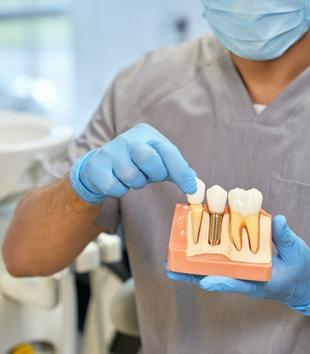
Millions of people in the U.S. have lost at least one tooth. If you’re one of them, you may be considering the surgical procedure of dental implants but are unsure whether implants are right for you. Here, we’ll help to steer you toward an informed decision on whether you’re a good dental implant candidate.
In fact, most people are good candidates for dental implants, which can replace one tooth, several teeth or all your teeth. Implants can be used to support a single crown, a full set of dentures or a dental bridge.
Good dental implant candidates are in good health and have a fully-developed jaw. Ideally, you should also have a sufficient quantity of quality bone in your jaw to anchor the implant. However, if there’s a problem, a bone graft may provide the solution.
To be a good candidate for dental implants, you have to commit to a high level of oral hygiene to look after your implanted teeth and surrounding gums. Regular brushing and flossing are imperative, and so are periodic check-ups and professional cleanings.
To determine whether dental implants are right for you, Washington State Prosthodontics can carry out a thorough evaluation of your mouth and jaw.
This will include a CT (Computed Tomography) scan. A CT scan produces a two-dimensional image but we have special technology that turns it into 3D. This helps us to identify any areas of bone loss and assess your sinuses and location of nerves – critical information ahead of a dental implant.
During your evaluation, we’ll also take into consideration your medical history. Your overall health plays an important role in how well your implant will fuse to the bone and how efficiently your mouth will heal.
Medical conditions that could mean you’re not an ideal dental implant candidate include:
You may still be a good dental implant candidate if you have a medical condition. It depends on the severity and extent of the ailment. We’ll need to carefully evaluate your situation and may need to work with you and your physician to improve your overall health.
Other factors that may raise questions over your suitability for implants are:
You may be a good dental implant candidate in the following circumstances.
You are missing a single tooth
If you have lost a single tooth, we can replace it with an implant crown. Unlike a bridge procedure, getting an implant crown avoids damage to adjacent teeth. It will also allow you to floss more effectively. Implant crowns are slightly more expensive than a tooth-supported bridge.
You are missing multiple teeth
If you have lost several teeth, you could be a good candidate for an implant-supported bridge, which is similar to a standard dental bridge but is not supported by natural teeth. Like an implant crown procedure, an implant-supported bridge entails no damage to surrounding teeth. You are missing all your teeth If you have lost all your teeth, clip-retained dentures can involve two implants or four or more. Two implants provide the least costly method to stabilize a lower denture but are not generally recommended for the upper jaw. With four or more implants, a clip-retained denture will give you a strong bite function and help to enhance your facial appearance.
Further options at Washington State Prosthodontics to replace all your teeth include:
Dental implants have the highest success rate of all surgical implant procedures – up to 98 per cent – and are considered the most innovative means of replacing teeth because they are unique in stimulating bone growth.
Implants can be used as an alternative to bridges and dentures or in conjunction with a dental plate. The varied uses of dental implants and their benefits compared with conventional tooth replacement systems has made them the treatment of choice for many people with missing teeth.
Implants can last a lifetime, so it pays to choose your implant dentist wisely. Implants inserted by surgically-qualified dentists have a higher success rate than implant procedures carried out by general dentists.
Washington State Prosthodontics are experts in treatments that are beyond the scope of general dentists. In 2014, the Journal of the American Dental Association (JADA) reported that almost 19 per cent of implants placed by general dentists failed.
Dr. Russell Johnson And Dr. Michael Johnson are highly-experienced, board-certified prosthodontists (specialist in prosthetic dentistry) and members of the American College of Prosthodontists and the American Academy of Maxillofacial Prosthetics (mouth, jaw and face prosthetics). We use only the highest quality implant materials that have been precisely crafted.
If you think you may be a good dental implant candidate, we can perform a detailed examination to determine whether implants are your best option.